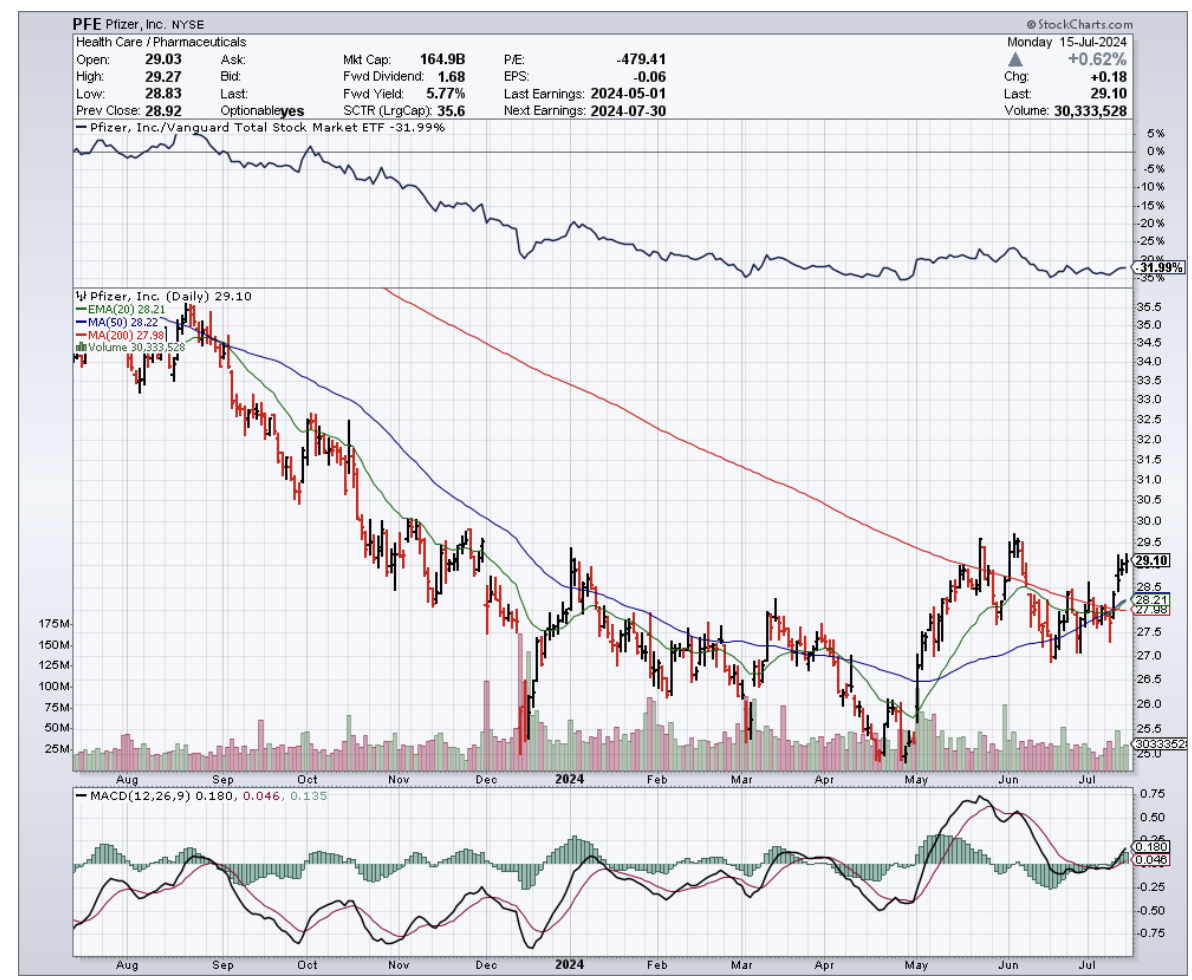From Golden Egg To Dud, And Back Again?
Remember when Pfizer (PFE) was strutting around Wall Street like a rooster in a henhouse, clucking about their $10 billion-a-year weight-loss wonder drug?
Well, that golden egg turned out to be a dud, with safety issues and side effects sending their experimental pills to the scrap heap faster than you can say "clinical trial failure."
Just when we thought Pfizer had thrown in the towel, they're back in the ring, swinging with a new once-daily version of danuglipron and pushing it towards bigger studies.
But let me tell you, the market's about as excited as I am for a vegan BBQ. Pfizer's shares nudged up a measly 0.4% upon announcement, after a brief 2.9% spike that fizzled faster than a diet soda.
Now, let's talk about the 800-pound gorillas in the room: Eli Lilly's (LLY) Zepbound and Novo Nordisk's (NVO) Wegovy.
These weekly jabs are the current darlings of the weight-loss world, but everyone and their grandmother are scrambling to get an oral GLP-1 to market. It's like watching a gold rush, except instead of pickaxes, they're wielding pipettes.
Lilly's got orfoglipron in Phase 3, with data coming faster than a day trader's heartbeat. Novo's already peddling Rybelsus, though it's about as effective as a chocolate teapot compared to the injectables.
And don't forget the up-and-comers: Viking Therapeutics (VKTX), Gilead Sciences (GILD), and Structure Therapeutics (GPCR) are all elbowing for a spot at the table.
Now, I know Pfizer's trying to convince us that their once-daily danuglipron is the bee's knees, with "encouraging pharmacokinetic data." But they're as tight-lipped about side effects as a politician at a press conference.
The research world’s not completely buying it, and frankly, neither am I. We might be waiting until the cows come home - or at least until 2026 - before we see if this pill's worth its weight in gold.
Meanwhile, Pfizer's stock has been sagging like a bulldog's jowls, down 1.5% this year and a gut-wrenching 21% over the past 12 months.
They're also staring down the barrel of a $17 billion revenue nosedive by 2030 as their patents fly the coop faster than pigeons at feeding time.
So, what has Pfizer been doing to deal with these? In recent months, the company has been on an acquisition bender that'd make a Vegas high-roller blush.
They snagged cancer specialist Seagen for a cool $43 billion, aiming to have eight blockbuster cancer drugs by 2030.
They're also playing footsie with BioNTech (BNTX) again, cooking up mRNA goodies like a COVID/flu combo vaccine. And let's not forget their partnership with Flagship Pioneering in the weight loss arena.
Over the past five years, Pfizer hasn’t been shy about spending money, securing over 20 new medicine approvals.
But Wall Street's been about as impressed as a cat with a new toy - they sniff at it and walk away. The stock took a 40% nosedive in 2023, partly thanks to their obesity program face-planting.
Still, Pfizer is not giving up so easily. In fact, they’ve worked to give their lineup a facelift. New approvals are rolling in faster than a greased pig at a county fair, and their pipeline's deeper than a philosopher on a bender.
Now, here's the million-dollar question: Is Pfizer a diamond in the rough or fool's gold? The market overreacted to their COVID-19 vaccine success, and now they might be overcorrecting in the other direction.
For those of you with nerves of steel and the patience of a Zen master, Pfizer could be a steal at these prices. If you don’t have the stomach for it, then I suggest you look elsewhere.


